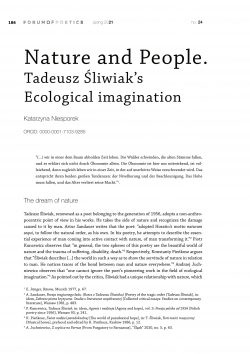
Katarzyna Niesporek
A b s t r a k t
This article examines the ecological imagination of the forgotten poet form the 1956 generation, Tadeusz Śliwiak, and his poem Oratorium [Oratorio] published in the volume Widnokres [Horizon] (1971), in the section entitled Ziemia [Earth]. The poet’s observations on nature are summarized in this poem. Śliwiak in his poems notes that while nature opens up to man and accepts him, man, feeling his superiority over nature, goes too far and constantly enters into conflicts with it. In the forest, apart from communing with nature, which man wants very much, hunters and lumberjacks interfere with the environment. Though it should be protected and open to all, nature is appropriated by man. The poet believes that people are responsible for the destruction of nature and asks an important question: “czy człowiek zdusi winę w sobie / ofiarą ognia i potrzebą / stołu i łodzi z parą wioseł?” [will man silence the blame in himself / through the sacrifice of fire and the need / for a table and a boat with a pair of oars]. Feeling responsible for the natural environment and believing that he is to blame for its destruction because he is human, Śliwiak tries to save “poezja lasu” [the poetry of the forest]. By showing the suffering and the painful effects of the destruction of nature in his poems, Śliwiak wants to give voice to it or speak on its behalf.





